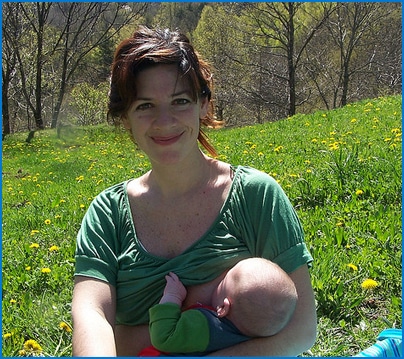
New research comes along every day, and breastfeeding is currently a topic of much concern (we have been exploring some of its angles on this blog). The latest interesting findings come from the Colorado School of Public Health, reported on for BusinessWeek by Robert Preidt.
It’s one of those “bad news, good news” scenarios. The bad news is, if a mom has diabetes while pregnant, there is a greater chance that the baby will be eventually categorized as an overweight or obese child. The good news is, a minimum of six months breastfeeding appears to cancel out that risk.
The researchers, led by Dr. Dana Dabelea, looked at children in the 6- to 13-year age range, whose mothers had been diabetic when carrying them, and compared them to children of the same ages with non-diabetic mothers. Among the kids who had been nursed for half a year, their weight statistics lined up pretty well with “normal.” But their non-breastfed peers put on weight. Still, there could be other factors involved, and the scientists admit it. Dabelea says:
Since childhood obesity and in utero exposure to maternal diabetes have both been associated with later development of type 2 diabetes, it follows that breast-feeding these children may also help reduce their future risk for developing type 2 [diabetes]. However, further research would be needed to confirm that added protection.
When the results of the study were published in Diabetes Care, they were accompanied by an editorial from Dr. Andreas Plagemann, an obstetrician from Germany, who said,
Profound evidence exists that breast-feeding has the potential to permanently decrease the long-term risk of developing obesity, as shown by the results of at least four meta-analyses on this issue.
But why? It is still not totally clear whether the breast milk per se, or the basic mammalian bonding activity of breastfeeding, are responsible for any differences that are observed. Dr. Pretlow suggests viewing this through the psychological food dependence/addiction lens. His own research shows that many children and teenagers characterize their relationships with certain foods as addictive, and indeed their behavior fulfills the criteria for addiction outlined in the DSM (Diagnostic and Statistical Manual of Mental Disorders). Dr. Pretlow says,
It may be that a closer bond between mother and infant, facilitated by breast-feeding, produces more secure infants and children. It may be that this bonding induces a lifelong foundation of psychological well-being, so the children are better able to handle the subsequent stresses of life. Secure children are less likely to be lonely and depressed and turn to food for comfort and coping with stress.
Dr. Pretlow points out that even when mothers don’t breastfeed their infants, they can still do an infinite amount of cuddling, talking, lullaby-singing, and rocking. In Overweight: What Kids Say, he urges parents to find ways of soothing infants other than feeding them. One suggestion is a teddy bear equipped for sound, to imitate the mother’s heartbeat, which is very comforting to a baby. It would really be great if parents could avoid the habit of using food as the tactic of first resort, to distract and quiet a child. Finding other methods will be rewarding in the long run.
We mentioned the part of Michelle Obama’s Let’s Move! initiative that encourages businesses to provide a secure, private place for nursing mothers to express breast milk to take home. If returning to work is a new mother’s only choice, providing this facility is important, not only for the baby but for the mother, who can otherwise experience a lot of discomfort by the end of the workday. But it’s not an ideal solution, especially if the major benefit of breastfeeding derives from the activity itself, with the actual fluid being of secondary importance.
If it’s not so much the milk as the cuddling that accomplishes the good, then no amount of bottled breast milk will have an impact on childhood obesity. Dr. Pretlow feels that a better idea would be to provide a workplace nursery where the mother can actually spend time personally breastfeeding her baby.
The ambiguity of the answers is partly responsible for the scorn the whole breastfeeding topic has attracted from non-believers. Some call it hype, like Polly Palumbo, writing for ParentDish. She is unsatisfied with the research so far, claiming that it looks only at the very early, nursing stage of life, and ignores years of subsequent childhood dietary habits, so the causal connection with childhood obesity is not, in her mind, solidly established. Palumbo writes,
Typically studies ask a question or two about breast-feeding, sometimes decades afterwards, then look at a mix of weight, body mass, and fat from infancy through early childhood to adolescence or young adulthood. Sometimes results show a benefit for breast-feeding, sometimes not… Breast-feeding benefits have nothing to do with breast milk and everything to do with parents, namely the differences between mothers who breast-feed and those who don’t. The former tend to have more education, higher incomes and let’s be honest, gym memberships and pantries full of whole grains.
For parents looking for solid advice, here it is. Give your baby lots of affection, cuddling, closeness, reassurance, and emotional security. Feeding the stomach is important, and feeding the heart is even more important. Food is for nourishment, not for bribery, pacification, or reward. And when your child gets old enough to talk, listen.
Your responses and feedback are welcome!
Source: “Breast-Feeding May Cut Obesity Risk in Kids of Diabetic Moms,” BusinessWeek, 02/25/11
Source: “Does This Formula Make Me Look Fat? Breast-Feeding and Childhood Obesity,” ParentDish, 02/24/11
Image by diluvi (diluvi.com Anna i Adria), used under its Creative Commons license.

 FAQs and Media Requests:
FAQs and Media Requests: 











